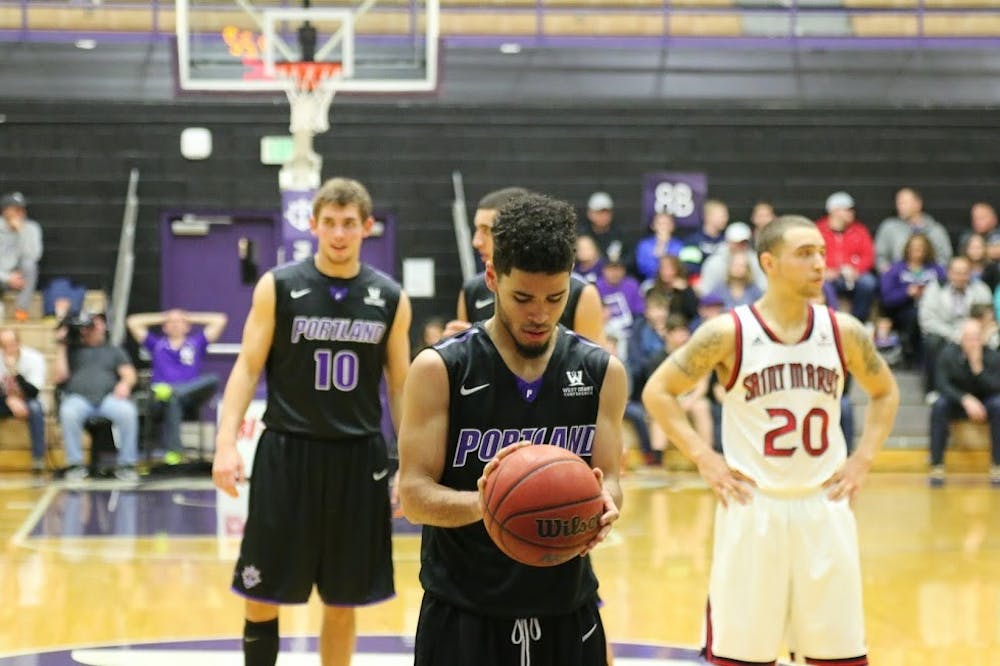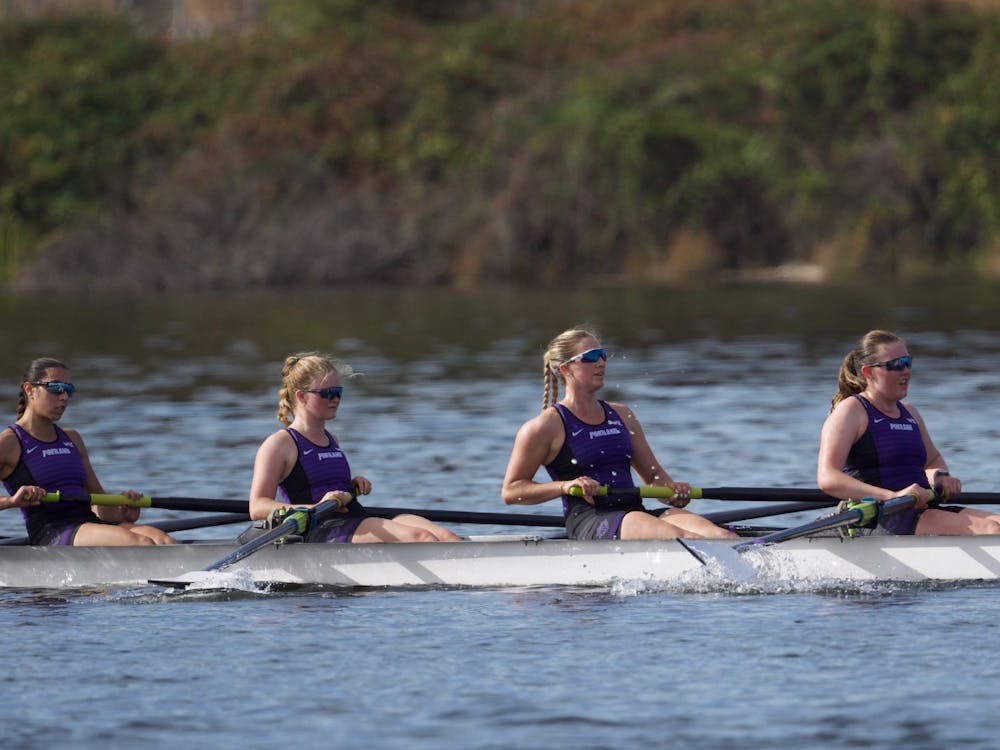by Malika Andrews |
In front of the Clark Library steps, Alec Wintering saunters across the cement pathways. It’s a chilly Tuesday afternoon, the kind where breath makes itself known and fingers want to hide in their gloved cocoons.
He sees an acquaintance out of the corner of his eye and throws a peace sign up over his head. He cracks a slight smile.
This is how Alec greets people off the court: He quietly throws up a sign to say "hi" because he is painfully shy.
Those reservations disappear when he's on the court. There, he's a ball of energy sprinting from end line to end line, usually with a silly grin on his face. Some people wear their past as an expression on their face. Not Alec.
It’s etched into his Nikes.
--
Alec picked up a basketball for the first time at three years old. His older brother, Daniel Wintering, bought him a tyke hoop and set it up in the middle of the kitchen in their home in Arizona.
“My brother was like my father figure,” Alec said.
Alec has never met his dad and said that he thinks he is dead now. He started receiving social security checks in his father’s name a few years ago. Alec said he never reached out to his dad and rarely asked his mom about him. Not that he didn’t consider seeking him out.
“If he was still around, being older, getting a chance to talk to him just to see whatever had happened and the thoughts about knowing he had a kid coming and leaving,” Alec said. “But I don’t really care.”
Daniel, only 21 at the time, said that being the father figure of the house posed challenges. He had already taken on that role when Coreen, Alec’s sister, was born four years prior to Alec. But with Alec, being a boy and coming from a single mother household, Daniel felt a special obligation to being his male role model.
“The challenge is ensuring that you live life to a moral standard, as a black male setting an example in regard to school, discipline and an overall manner in today's world,” Daniel said in an email. “It was a challenge I accepted, realizing what a great opportunity it was for us to grow and learn from one another.”
Daniel said their relationship was not only father to son, but coach to player. He taught Alec how to hold the ball, and how to shoot it. Daniel would pick up pots and pans and bang spoons against them to create a distraction as the 3-year-old put up shots, trying to prepare him for future hostile crowds.
As Alec grew taller, the tyke hoop was raised higher and higher. Eventually he graduated from shooting with the plastic ball in the kitchen. Only 5’6” as a freshman, Alec played point guard for Sunnyslope High School.
But with his brother, his coach and idol, across the country, it wasn’t a surprise when Alec chose to follow, leave his mom behind and move to North Carolina.
--
Alec lived two lives in North Carolina. In basketball, despite being undersized, Alec was flourishing. During his junior year of high school at United Faith Christian Academy, Alec was coached by 14-year NBA veteran Muggsy Bogues, who at 5’3” is the shortest guy ever to play in the league.
“He had just got the job the year before I got there,” Alec said. “Then when I was transferring I was just looking at schools and I saw he was a coach there so I was like, wow that would be a lot of help for me just to grow as a player, grow as a person.”
Alec said that he could relate to Bogues because they were both small point guards. More than that, Bogues’ basketball IQ from 14 years in the league opened Alec’s eyes to new ways to play the game.
On the court, Alec met Josh Level, a top prospect in North Carolina’s class of 2014. Level had scholarship offers from Oklahoma State and North Carolina State. Level was one of the first people Alec met in North Carolina, one of the first to break him out of his shell and become his friend.
“He was just the most genuine dude, always had a smile on his face (and) was always joking,” Alec said.
Making three-pointers and making friends came easily. Making ends meet at home was harder.
Alec’s mom, Geralyn Wintering had lost her job at Arizona State. The apartment Alec lived in with her in North Carolina had no heat.
“The thing with the heat in Charlotte, it was just too expensive,” Geralyn said. “I had lost my job in 2011 in Arizona and my older son and Alec were in Charlotte so they told me to move there and they let me stay with them. But still, it was hard.”
It took Geralyn several months to find one. When she found a job, she and Alec moved to an apartment without heat. For a couple hundred dollars, the large oil drums outside the house could be filled and provide enough heat to last a winter. But the Winterings did not have that kind of money.
Instead, when Alec and his mom would come home from work and school, they would heat their clothes in the dryer and turn the oven on with the door open to warm the apartment.
Sometimes, Geralyn would buy food from the food bank. She described it as, “not horrible but still a struggle.” There were days Alec went to school with just a container of rice for lunch.
“(It was) not like, the worst poverty … we weren’t the worst off, but we weren’t the best off either,” Alec said.
--
The coaches at the University of Portland first heard about Alec when he was a high schooler in Arizona. They thought they had lost him when he moved to North Carolina, which is, after all, home to 18 Division I basketball schools.
Despite the cross country move and off-the-court struggles, Alec never ceased to amaze on the court. At just 5’9”, he was the No. 3 point guard in the state, averaging 16.7 points, 6.3 assists, 2.9 rebounds and 3.4 steals as a senior.
The Pilots knew about Alec because he hailed from the same school as former Pilot T.J. Campbell.
In need of a point guard, assistant men’s basketball coach Eric Jackson went to see Alec play in Charlotte in July of 2012. The Pilots were close to signing Alec or another player, but needed to see Alec play in person.
The gym was full of scouts from North Carolina.
“They were like, ‘Portland? What are you doing out here?’” Jackson said. “'You’re not getting a guy from North Carolina to go out to Portland' … I’m sitting there and watching Alec play and it’s just so obvious he is the best player out of the floor.”
But at barely 5’9”, Alec was undersized.
“I think guys did not get excited about him because he was small,” Jackson said. “But he was so good. I remember watching his first game that afternoon and calling coach (Eric Reveno) right afterwards and I’m like, this is the guy.”
Shortly after, head coach Reveno offered Alec a scholarship to play for Portland.
--
The Pilots’ offense was falling apart without a point guard. They needed Alec.
The Portland Tribune said he could be the best thing to happen to Portland’s basketball program since Campbell. The Oregonian called Alec a “5-foot-11 problem solver” his freshman year. Really, Alec is 5’10” without shoes.
He did solve many of Portland’s problems on the court. Starting in all 27 games his freshman season, Alec helped Portland win four more games than they did the previous season including a win over then No. 18 Gonzaga, which was the first over the Bulldogs in 20 years.
“He is probably one of the best leaders we’ve ever had,” Jackson said.
But even on the court, where Alec was the happiest, he was still keeping things to himself.
That same year, Alec’s mom was diagnosed with stage two breast cancer. She called to tell him.
“I remember being in shock all day. It was the only thing I could think about,” Alec said.
But he didn’t tell anyone.
Then, another shock. Level died. At 17 years old, the friend Alec had grown so close with in North Carolina collapsed during a timeout in the third quarter of a game.
He kept his grief to himself.
--
The Chiles Center has been called a cemetery, a place where coaches’ careers have been left to die. On game day, it is announced as “the palace on The Bluff.” Sometimes, the white dome is compared to an alien’s hovercraft, but it is not often called a sanctuary.
But that is what it is for Alec.
The floodlights are the only ones left on late at night. Those, and the lights of the basketball court. Alec, now in his third year as starting point guard for the Pilots, can be found there, putting up shots.
“If something is on my mind, if I want to get away, I’ll come here late at night and shoot … clear my head,” Alec said.
There is no brother to bang spoons on pans. The hoop is 10 feet tall, not a Little Tikes easy score basketball set. There have been no greats to come out of Portland. The only player to go from the Chiles Center to the NBA recently was Eugene “Pooh” Jeter who played one year with the Sacramento Kings in 2010.
But still, there is something special about Chiles Center, something special for Alec. He hides it well, but he plays with a chip on his shoulder and he plays for the name on the back of the jersey — his mom, who fights for everything Alec has, his siblings, his nieces and nephews.
Of course, Alec plays for his team too. As a captain, he carries them as much now as he did his freshman year. But this Pilots team is different. It is different in the ways that the Pilots have already announced: six new faces, more athletic. But it is also the first team Alec has opened up to about his mom’s cancer, the first team he has told about growing up without a father.
Before every game, Alec laces up his Nikes and writes CDM on them. C for his sister, Coreen, D for Daniel and M for mom. He etches Josh Level’s name alongside Cameron Israel, another friend who died in a car accident in Arizona in June of 2015.
“It’s just the kind of stuff that makes me who I am today,” Alec said, holding back tears. “Not a lot of people know it, really very few people know it about me. Because that’s in the past now so I just try to move on and be positive and make everyone around me positive.”
But Alec said the worst is behind him. Now, he plays for those who can’t, keeps to himself and does it with a smile on his face.
“I’ve lost some people and my mom had breast cancer,” Alec said, as the tears started to fall. “I think the things that make people upset are really minute … With me, I’m always happy and smiling just because if someone sees me smiling, it makes their day better.”
And so he throws up the peace sign, with a half cracked grin, and continues past the library, across the parking lot to the Chiles Center.
Malika Andrews is the sports editor for The Beacon. She can be reached at andrewsm17@up.edu or on Twitter @malika_andrews.








